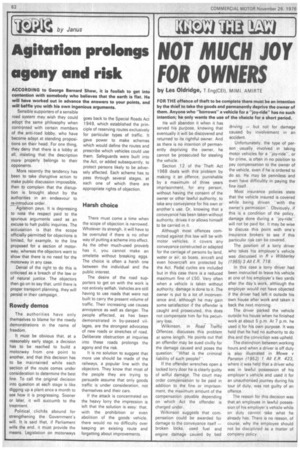Agitation prolongs agony and risk
Page 64

If you've noticed an error in this article please click here to report it so we can fix it.
ACCORDING to George Bernard Shaw, it is foolish to get into contention with somebody who believes that the earth is flat. He will have worked out in advance the answers to your points, and will baffle you with his own ingenious arguments.
Sensible supporters of a sensible road system may wish they could adopt the same philosophy when contronted with certain members of the anti-road lobby, who have become adept at standing propositions on their head. For one thing, they deny that there is a lobby at all, insisting that the description more properly belongs to their opponents More recently the tendency has been to take disruptive action to make public discussion impossible, then to complain that the disruption is brought about by the authorities in an endeavour to re-introduce order.
Agitation pays. It is depressing to note the respect paid to the spurious arguments used as an sexcuse to halt public inquiries. The accusation is that the scope officially permitted for objections is limited, for example, to the line proposed for a section of motorway, whereas the objectors want to show that there is no need for the motorway in any case.
Denial of the right to do this is criticised as a breach of the law or of natural justice. The objectors then go on to say that, until there is proper transport planning, they will persist in their campaign.
Rowdy demos
The authorities have only themselves to blame for the rowdy demonstrations in the name of freedom.
It must be obvious that, at a reasonably early stage, a decision has to be reached to build a motorway from one point to another, and that this decision has to be maintained while each section of the route comes under consideration to determine the best line. To call the original decision into question at each stage is like digging up a plant once a month to see how it is progressing. Sooner or later, it will succumb to the treatment.
Political clichés abound for strengthening the Government's will. It is said that, if Parliament wills the end, it must provide the means. Legislation on motorways goes back to the Special Roads Act 1949, which established the principle of reserving routes exclusively for particular types of traffic. It gave power to make schemes which would define the routes and prescribe which vehicles could use them. Safeguards were built into the Act, or added subsequently. to protect persons likely to be adversely affected. Each scheme has to pass through several stages, at each one of which there are appropriate rights of objection
Harsh choice
There must come a time when the scope of objection is narrowed. Whatever its strengh, it will have to be overruled if there is no other way of putting a scheme into effect. As the other much-used proverb has it, you cannot make an omelette without breaking eggs. The choice is often a harsh one between the individual and the public interest.
The desire of the road supporters to get on with the work is not entirely selfish. Vehicles are still having to use roads that were not built to carry the present volume of traffic. Their increasing use causes annoyance as well as danger. The people affected, as has been demonstrated in by-passed villages, are the strongest advocates of new roads or stretches of road. Deliberate obstruction at inquiries into these roads prolongs the agony and the risk.
It is no solution to suggest that more use should be made of the railways, a popular line with the objectors. They know that most of the people they are trying to persuade assume that only goods traffic is under consideration, not themselves and their cars.
If the attack is concentrated on the heavy lorry the impression is left that the solution is easy: that. with the prohibition or even abolition of the goods • vehicle, there would no no difficulty over keeping an existing route and forgetting about improvements








































































































